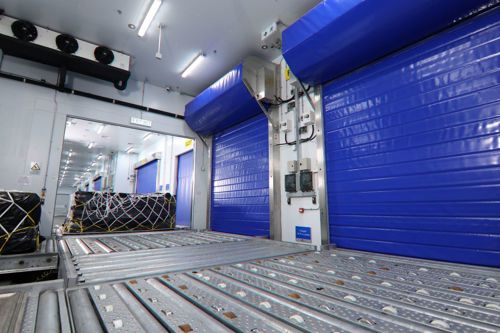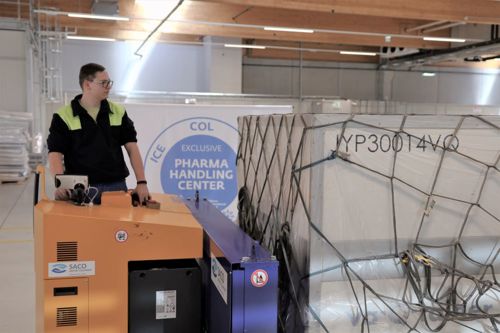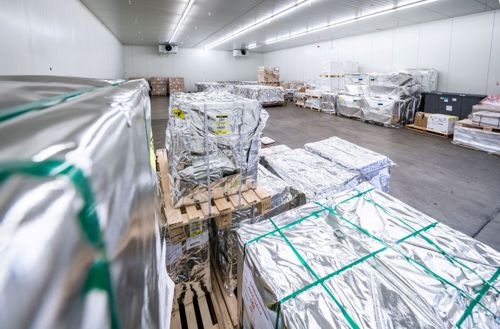
Picture credit: American Airlines Cargo
Pharmaceuticals are a commodity American Airlines Cargo has been proudly handling for years, says Brian Hodges, Managing Director Strategy & Planning, who says there are a lot of different handling requirements.
They have varying shipping and handling needs with some temperature sensitive products needing temperature-controlled containers, others can handle passive packaging keeping within a comfortable temperature range and some just need to get to their destination quickly and have no temperature requirements.
American Airlines Cargo has the products and services required with ExpediteTC offering active containerised and passive pre-package options for cold-chain pharmaceuticals. PPS and Critical PPS prioritise shipments weighing less than 100lb with the highest visibility tracking.
Hodges says, “Apart from having the right products and services, we also have teams that are well-trained and facilities well-equipped to maintain the integrity of these kinds of shipments for the duration they are in our care.”
Demand had been growing for several years with the TC product proving strong in 2021 and 2022, and American Airlines Cargo wants to keep up with market growth.
Hodges says, “Expanding our passive temperature-controlled capabilities on all our Airbus aircraft in 2021 allows us to carry smaller shipments on our narrowbody aircraft, which offers customers more solutions for moving these important pharmaceuticals where they need to go and allows us to say yes to more pharma business.”
No one could have predicted the pandemic so it should the importance of being prepared for what you do not know, says Hodges, because it can mean having to adapt business models to meet changing customer demands.
Looking back on performance during the pandemic, Hodges says, “I’m incredibly proud of the way our team came together to solve complex issues, like launching the cargo-only flight programme or finding new ways to accommodate customer needs for vaccine production and distribution. We came together within Cargo and across American to make sure we were supporting the world as best we could with the resources we had available.”
Increased demand for pharma-related business creates opportunities to examine offerings and see where unmet needs are, says Hodges, and it is important to remember that there is not a one-size-fits-all solution.
He says, “Our success in this expanding market will be determined by how well we utilise our current tools to meet these needs, and in how open we are to adopting new tools and technologies into our operation. The pharmaceutical world is ever changing, and to keep up we will have to offer modern capabilities paired with operational and customer service excellence for these kinds of shipments.”

Reliable solutions
The safe handling of pharmaceuticals requires the right facilities. Asia Airfreight Terminals (AAT) set Lödige Industries the challenge developing the first IATA CEIV Pharma-certified cold chain system at Hong Kong International Airport that provides a fully temperature-controlled environment, says Nicholas Tripptree, Managing Director APAC at Lödige Industries.
He says, “This requires reliable solutions, ensuring that shipments are handled and forwarded without any interruption, especially for cold chain items that are very sensitive to hot and humid climates such as those in Hong Kong.”
Due to temperature-controlled truck docks to prevent disruption to the cold chain during acceptance and delivery, it is possible to cover the entire cargo handling process at the AAT COOLPORT in a temperature-controlled environment.
The main equipment includes a hydraulic lift for transferring cargo from the dolly to the MHS system, right angle decks, power roller decks and interfacing decks for optimal flows of transport.
Systems designed for temperature-controlled products come with their own challenges, says Tripptree, who says the AAT COOLPORT was designed to ensure appropriate temperature-controlled areas for segregation requirements which are secure and have the capacity to store and handle temperature- and time-sensitive products.
Tripptree says, “Above all, speed of handling is required to get the time and temperature-sensitive goods into the appropriate temperature zones upon cargo check-in or out within AAT terminal. With the equipping of the state-of-the-art pallet container system and ball mat in AAT COOLPORT, it provides better traceability of the ULDs and available workstations for the respective areas.”
Each project brings its own challenges, with the high humidity in Hong Kong leading to mist problems when transporting cargo across zones with high temperature differences.
Tripptree says, “We had to take this into account in the technology we used. Therefore, we adopted ultrasonic sensors for MHS equipment at the warm side to avoid malfunctions of normal sensors. Furthermore, when selecting the motor and sensor models, care was taken to ensure that they are suitable for low temperatures down to -28°C.”

Specialised handling
In 2022, the Vienna Airport Pharma Handling Center handled over 3,600 tons of temperature-sensitive goods, up 64% in a year and 173% higher than in 2019, the last pre-pandemic year.
The types of products handled include different human medicines, vaccines, surgical glues and even veterinary products.
Michael Zach, Vice President Sales, Finance & Cargo, Ground Handling and Cargo Operations at Vienna International Airport, says, “The very high quality of our processes is the same for all pharmaceutical items, so the differences in the product type of the pharmaceuticals are actually not crucial. All product groups have been on the rise since the beginning of the pandemic.”
The GDP-certified facility has two large-scale cooling warehouses with 150 square metres for 2-8 degrees Celsius and 1,600 square metres for 15-25 degrees Celsius. Mobile refrigeration equipment is used to maintain temperatures between air and land side.
Temperature monitoring sensors and CCTV ensure shipments are monitored and documented along the supply chain including in cool trailers and outside areas.
Zach says, “Customers benefit from the advanced level of digitalisation. Since the end of 2021, the VPHC has been able to upload all relevant data to an internet cloud. This facilitates documentation enormously and enables a transparent overview.”
Not breaking the cold chain when transporting goods between the aircraft and facilities has been a focus area for the industry.
In Vienna, cool trailers, which run on diesel and electricity, can manage cargo in a range from -20 to +30 degrees Celsius and load all pallets and containers up to two metres in external dimensions.
For LD3 containers and PMC, reusable and waterproof blankets are available for heat protection, and Va-Q-proof boxes are provided for loose shipments.
Pharmaceuticals are valuable and important cargo so the VPHC is offering greater transparency through the introduction of cloud-based services and is working on Internet-of-Things applications.
Zach says, “We are integrating flight-capable tracking units into our processes, which will further improve the monitoring and analysis of the cold chains. With this, we will further advance digitalisation in the VPHC.”
Operating sustainably is important as sustainable value chains is something pharmaceutical producers increasingly demand.
Zach says, “As the operator of the VPHC, Vienna Airport has achieved CO2-neutral operations in 2023 and has commissioned Austria’s largest photovoltaic system, which can also supply the VPHC with electricity.”
Volumes of pharmaceuticals are likely to go up and another trend Zach sees is internationalisation of the pharmaceutical industry with Asia transforming itself from an importer to an exporter. Medicines being produced more individually to meet specific patient needs is also likely to be a trend.
Zach says, “Additives and production materials that were previously only delivered to large manufacturing hotspots will thus be distributed more widely in the future. Due to the small number of interfaces and operational speed, the aeroplane will remain the first choice here as well, since carriers have fewer uncertainties and more planning security.”

Community approach
Frankfurt Airport is one of the busiest cargo airports in Europe and the world, and its cargo community came together during the pandemic to ensure that vital shipments were handled properly and efficiently.
Anne Smirr, Director of Marketing and Sales at Frankfurt Cargo Services, a subsidiary of Worldwide Flight Services, says it very quickly became clear that all players had to work closely together to cope with an enormous increase in tonnage and to coordinate the flows. They also had to guarantee proper handling and maintain the cold chain.
Smirr says, “A regular and comprehensive communication about the situation was quickly established between the airport operator, aircraft and cargo handlers, as well as forwarding agents and service providers. Air Cargo Community Frankfurt also had its own pharma competence team that helped with coordination.”
It was not just the tonnage which was a challenge, the number of shipments was much higher than normal times.
At peak times, mask imports caused the number of individual parcels to rise to 60,000 in FCS’s warehouse compared to around 20,000 on a normal day.
Smirr says, “In quantities of this type of record tonnage, priority has been given to pharmaceutical items. Delays here were proactively counteracted with prioritised express shipments or individual arrangements for pharma goods.”
The pandemic is over but Smirr says there have been benefits, mainly agility and communication have improved, as did digitalisation and optimisation of interfaces.
Some things have not changed, cargo handling is still labour intensive, which creates staff scheduling challenges. FCS responds to this with modern staff planning tools and talking to customers about expected business development.
Smirr says, “Cargo handling has become more short-term to plan overall, even after Coronavirus hit. Instead of seasonal flight plans for half a year as in the past, we now sometimes only receive flight plans from customers on a weekly basis with only a few days notice.”
Capacity upstream and downstream is also an issue, which can lead to flight delays or cancellations at short notice.
This means FCS has to react quickly and have resources such as mobile solutions to be deployed at short notice.
Mobile refrigeration units are used to react to increased tonnage with 44 pallets able to fit into the so-called Superboxes, which can maintain temperatures between 2-8 or 15-25 degrees Celsius.
Like its handling facility, FCS puts a high value into the training of its staff, processes and monitoring. FCS has a separate pharma handling crew and has staff on standby 24/7.
Processes are agreed downstream with freight transport companies to ensure smooth and efficient handovers and individual services agreements with airlines are in place to meet their needs.
In September 2020, FCS received IATA CEIV Pharma certification and GDP certification from the EU followed a month later.
Preparation for both started long before the pandemic and they help answer questions from customers about processes immediately.
Smirr says, “As the most important certificates for pharma handling in the air cargo sector, CEIV and GDP give customers a real sense of confidence in our standardised services and storage conditions. Today, we see that airlines attach more importance to the CEIV and GDP certificates than they did a few years ago.”
FCS expects volumes to continue going up with airlines enhancing their pharma products and medication becomes more individual.
Air cargo is the best way to transport pharmaceuticals, particularly temperature-sensitive produce with Smirr saying, “It is the fastest route and has the fewest numbers of intersections, making it unmatchable in terms of planning, documentation as well as safety and resilience.”
This article was published in the April issue of Air Logistics International, click here to read the digital edition and click here to subscribe.
